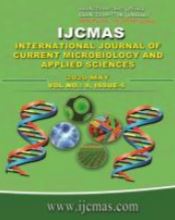


 National Academy of Agricultural Sciences (NAAS)
National Academy of Agricultural Sciences (NAAS)

|
PRINT ISSN : 2319-7692
Online ISSN : 2319-7706 Issues : 12 per year Publisher : Excellent Publishers Email : editorijcmas@gmail.com / submit@ijcmas.com Editor-in-chief: Dr.M.Prakash Index Copernicus ICV 2018: 95.39 NAAS RATING 2020: 5.38 |
Since the recent past, intensive shrimp culture has become widely spread and applied because of the diminishing farming land and to regulate proper discharge/processing of wastewater for monitoring environmental conditions. These systems tend to culture shrimps at high stocking density which is one of the most important factor in shrimp culture, and bear the potential to influence growth and survival of shrimp due to the stress response induced by crowding. Aquatic animals are likely to suffer from oxidative stress when cultured under high stocking densities as well as during pH fluctuations, decrease in temperature, salinity fluctuations, environmental hypoxia and re-oxygenation, bacterial invasion. Moreover, high stocking density increases the chance of disease outbreaks in shrimp ponds. Inactivation of antioxidant enzymes in infected shrimps can lead to oxidative stress and tissue damage leading to system failure and sudden death. However, an elevated expression of antioxidant enzymes including Superoxide dismutase, Catalase, Glutathione peroxidases and Heat shock protein (HSP) are observed in shrimps under high stocking densities to mitigate the negative effects of oxidative stress. In this review we have discussed about the effects of stocking density in nursery system on stress and change in the expression of antioxidant enzymes and non-enzyme molecules.
 |
 |
 |
 |
 |